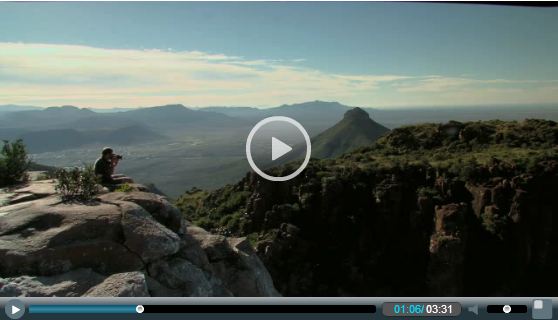South African Anti-Fracking Activist Calls for Global Alliance by Sandra Postel, May 13, 2013, National Geographic’s Freshwater Initiative in Water Currents
“We’ve got to stop doing this,” said Jonathan Deal, with a sense of urgency tinged with discomfort. Deal could well have been talking about hydraulic fracturing, or fracking, the oil and gas drilling practice he has tirelessly fought to stop in his native South Africa. But at this moment, he was talking about the energy-guzzling extravaganza in full swing all around us at a gathering in Washington, DC. As we eyed hundreds of people in cocktail attire partaking of bounteous food and wine across a chandeliered room, I sensed Deal’s inner discord: this lavish event was in honor of him. Deal had just been awarded a Goldman Environmental Prize for his successful grassroots effort to win a moratorium on fracking in South Africa. And on this mid-April spring night at the Ronald Reagan Building near the National Mall, a magnificent reception followed a ceremony to honor and applaud Deal’s success, along with that of the five other remarkable 2013 prize winners. While Deal accepted his award with humility and grace, and was deeply grateful for the spotlight it shined on his work, he was making an important point. Unless we rein in our energy consumption, his fight will have been for naught. And it must start with each of us, here and now, addressing the discord between what we know and what we do.
With no prior experience in grassroots organizing, Deal orchestrated a campaign against fracking in South Africa to protect the Karoo, a semi-desert region of the eastern Cape that he had come to know and love. Famed for its beauty, the Karoo boasts the richest diversity of succulents on the planet, and is home to many unique species of lizards and tortoises, as well as the riverine rabbit, one of the most endangered mammals in all of Africa. … Deal, who had written a book on the Karoo, took on the mantle of activist to save his beloved land from the onslaught of drilling rigs and tanker trucks, and the threats of water stress, well failures and toxic pollution. Deal formed the Treasure the Karoo Action Group (TKAG) and led a team of scientists, legal experts, and volunteers in preparing a report on the risks of fracking in the Karoo. TKAG delivered the report, which called for a moratorium on fracking, to President Jacob Zuma. Deal also challenged Shell executives to debate the merits of fracking at public meetings and in the media. Deal’s hard work and personal sacrifices – he poured his family’s savings into the campaign – paid off when, in April 2011, the South African government announced a nationwide moratorium on fracking.
But the moratorium lasted only 17 months: in September 2012, the government lifted it. Still, Deal and TKAG had gotten South African officials to take the dangers of fracking more seriously, and studies are now under way to more carefully examine fracking’s risks to the Karoo environment. Ten days after the ceremony in Washington, DC, Deal was in Elmira, New York, sharing his experience in South Africa with community members concerned about the threats of fracking in their region. … We can’t beat this country by country, Deal said. There needs to be “a global alliance.” … Meanwhile, back in his native South Africa, Deal’s own organization will get a significant boost from his Goldman recognition: Deal is giving his $150,000 in prize money to TKAG to strengthen the fight to save the Karoo. [Emphasis added]
Jonathan Deal Receives Goldman Environmental Prize for his work protecting the Karoo from Fracing 3:31 Min. narrated by Robert Redford, 2013
I think in terms stopping the advent of fracking in this country, it became very clear to us that the stronger way to attack this would be through the courts. Our constitution guarantees the right for every single person in this country to live in an environment that is not harmful to their health and well being, and it provides for the protection of the environment for future generations.

